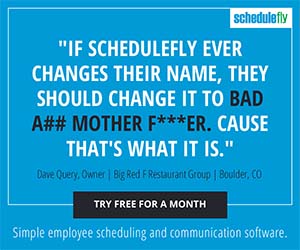
Crib Sheet: Tip Pooling
A legal guide to tip pooling.
As labor and employment attorneys for Messner Reeves, LLP, we regularly field calls from operators about tip pooling and service charges—no surprise, since the rules governing these pay models are snarled. If you’re considering shifting your pay model, or have already implemented pooling or service charges, know that you have some legal obligations.
A Primer on the Primary Pay Models Restaurants Use
- Traditional tipping: Servers and other front-of-house staff keep their own tips, and may voluntarily tip out bartenders, barbacks, or bussers. The employer typically pays the tipped minimum wage to servers, and tips close the gap. The employer cannot require tip-outs.
- Tip pooling: Servers and other front-of-house staff are required to contribute their tips to a pool, which is then distributed to the front-of-house staff according to pool parameters. The employer typically pays the tipped minimum wage to servers, and tips close the gap. If all employees are paid an hourly rate of at least full minimum wage, the tip pool may be expanded to back-of-house staff as well. There are some major legal considerations for the mechanics of tip pooling, which we’ll get into on the next page.
- Service charge: A mandatory charge tacked onto the bill. We’re seeing more and more restaurants add some kind of service charge to their checks, and some restaurants skip tipping entirely in favor of a 20 percent (or more) service charge. (This is especially appealing during COVID when many salaried managers—who cannot otherwise share in tips—are taking on traditionally tipped roles.) Service charges count as revenue to the business and they must be taxed like income. Also of note: This does not count as tipping. You’ll need to pay a base wage of at least full minimum wage. Any part of a service charge allocated to an employee must be included in the employee’s regular rate calculation (for determining any overtime premium that may be due), and must be treated like wages for purposes of payroll and income taxes.
- Mix and match: Restaurants use hybrids of all of these. One popular combination is to use a tip pool among the front-of-house staff and add a small service charge for the back of house.
No matter which model you use, you should consult a lawyer about it, especially if you’re making changes. If you get into legal trouble for breaking the rules, it could affect wages you’ve paid going back years—a penalty that could be extremely costly.
No matter which model you use, you should consult a lawyer about it, especially if you’re making changes.
Let’s Address Some of the Most Common Questions We Receive
- Do service charges count as tips? No, service charges do not count as tips. You must pay full minimum wage if you decide to utilize a service charge instead of tipping.
- Who can share in the tip pool?
- Generally, the front-of-house folks who are not supervisors.
- Back-of-house folks can share in the tip pool, but you need to pay everyone (back and front) a base wage of at least full minimum wage. You must also notify employees of the tip-pool parameters, and you need to notify customers via table tent, ticket, or menu. We recommend language along the lines of, “Everyone who worked on the guest experience shares in the tips.”
- Managers, supervisors, and owners cannot share in the tip pool. However, service charges can be distributed to managers.
- What if my manager is also working as a server? Can he or she share in the tip pool then? The general rule is no, but there may be some very (VERY) limited exceptions. Consult your attorney, because the risk of screwing this up is high, and the consequences are severe.
- I want to take the tip credit. How do I do that legally? If you want to take the tip credit, then only employees who customarily and regularly receive tips can take tips home and/or participate in the tip pool, namely servers, bartenders, and bussers. It’s murkier for hosts and barbacks, especially under the regulation that says tipped employees must spend at least 80 percent of their time on customer-facing activities and can only spend 20 percent of their time on other tasks like side work. While the Trump administration indicated it would eliminate this rule, it’s unclear if the Biden administration will follow through on that. Finally, if you dock credit card processing fees from an employee’s tips, you cannot take the tip credit (and docking the processing fees cannot take an employee’s hourly wage below full minimum wage).
- What about hosts? If hosts frequently get tipped in your community, then you may be able to include them. If that’s not customary, you should leave them out of the tip pool. Consult an attorney about your unique situation.
- What do I need to tell employees about my pay model?
- If you’re taking the tip credit, you must notify employees of that and the fact they’ll be paid the tipped minimum wage. Put it in a written policy, notice, or memo (or however you typically communicate with your employees in writing), and get an acknowledgement back from each employee.
- If you’re doing a tip pool, you must establish the tip-pool parameters and notify employees of the parameters in advance. Put it in writing, and get an acknowledgement back from your employees.
Note that the legal environment around tipping and minimum wage is changing very quickly—keep an eye out for updates that might impact these rules. It’s best to consult a labor law attorney about your pay model and the parameters of your tip pool (if you employ one) or your service charges (if you use them). We’ve seen a variety of common mistakes that can be incredibly costly, even if they were made in good faith.
John Shunk is a partner and LaRona Kitzinger is an associate at Messner Reeves, LLP, a law firm in Denver and other U.S. locations. Both attorneys regularly assist employers with labor and employment law matters. If you’re a Colorado restaurant in need of assistance, reach out to jshunk@messner.com or lmondt@messner.com.
Talk to us! Email your experiences (and thoughts, opinions, and questions—anything, really) to askus@diningout.com.












Comments are closed.